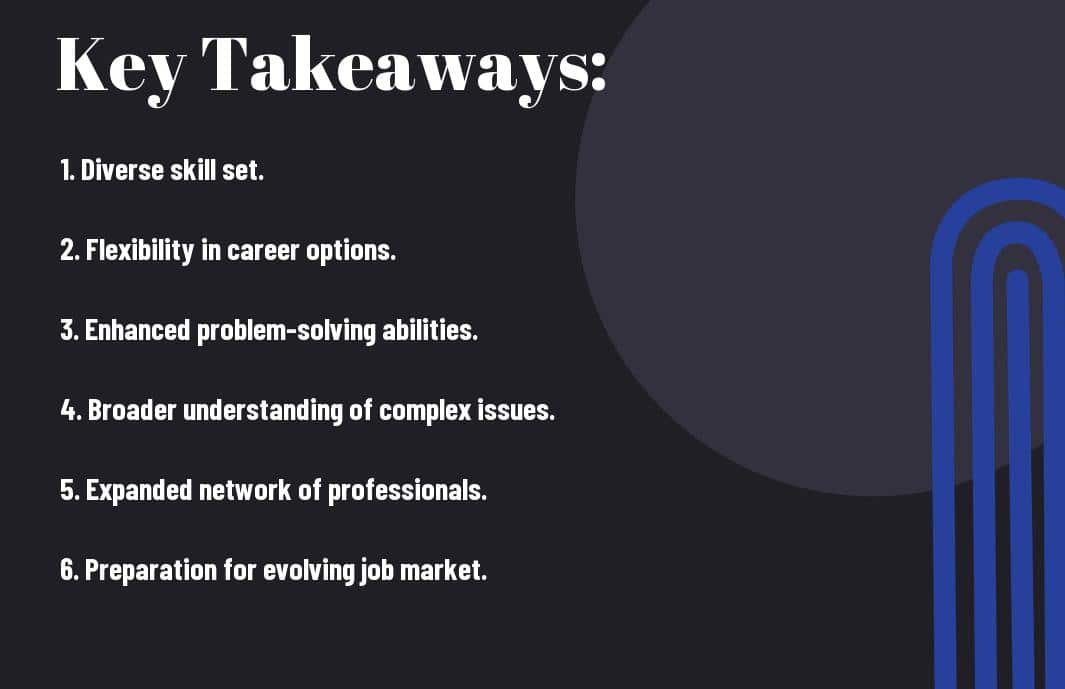Embarking on a journey to pursue a multidisciplinary degree in university can be a daunting yet rewarding experience. The implications of such a decision can be profound, with both positive and challenging outcomes.
Key Takeaways:
- Broader Perspective: Pursuing a multidisciplinary degree in university allows students to gain a broader perspective by studying various subjects, which can lead to a deeper understanding of the world and its complexities.
- Enhanced Problem-Solving Skills: Multidisciplinary degrees can help students develop strong critical thinking and problem-solving skills by learning how to integrate knowledge from different disciplines to address complex challenges.
- Adaptability and Versatility: Graduating with a multidisciplinary degree can make students more adaptable and versatile, as they are equipped with diverse skills and knowledge that can be applied to a wide range of career paths and industries.
The Genesis of Multidisciplinary Programs
Some people might wonder how universities came up with the idea of offering multidisciplinary programs. It all started with the realization that traditional, single-discipline degrees might not always prepare students for the complex and interconnected challenges of the real world. Instead, universities began to recognize the value of integrating knowledge and skills from various fields to create well-rounded, adaptable graduates. If you’re interested in learning more about multidisciplinary studies, check out Multidisciplinary Studies at Bard College.
Historical Context
To understand the genesis of multidisciplinary programs, we need to look back at the historical context of education. In the past, universities primarily focused on teaching specialized knowledge within distinct disciplines. However, as society evolved and the problems we face became more complex, it became clear that a multidisciplinary approach was necessary to address these challenges.
Furthermore, the Renaissance period sparked a renewed interest in the interconnectedness of knowledge, planting the seeds for multidisciplinary thinking. This shift in mindset laid the groundwork for the emergence of interdisciplinary studies in the modern educational landscape.
The Modern Educational Landscape
Multidisciplinary programs have gained traction in the modern educational landscape due to the growing recognition that real-world problems are often multifaceted and require diverse expertise to solve. As a result, universities have started offering interdisciplinary degrees that blend insights from various fields, such as science, technology, engineering, arts, and mathematics (STEAM), to prepare students for the complexities of the 21st century.
These programs are designed to equip students with a versatile skill set that enables them to think critically, solve problems creatively, and adapt to dynamic environments, making them highly sought after in today’s competitive job market.
Why Multidisciplinary? Exploring the Rationale
Any college student who has ever felt torn between two different fields of study knows the struggle of choosing a major. Should it be science or the arts? Business or technology? The beauty of pursuing a multidisciplinary degree is that it allows you to combine multiple disciplines into a cohesive educational experience, offering a holistic approach to learning and problem-solving.
Bridging Knowledge Gaps
Bridging the gap between different fields of study is one of the main reasons why pursuing a multidisciplinary degree is so valuable. It allows students to gain a deeper understanding of how different disciplines intersect and complement each other. For example, a student studying both psychology and economics may uncover connections between human behavior and financial decision-making that a single-discipline approach would overlook. This ability to see the big picture and make connections across disciplines is a valuable skill in today’s complex world.
Responding to a Dynamic World
The world is constantly evolving, and the challenges we face often require a combination of skills and knowledge from various fields. By pursuing a multidisciplinary degree, students are better equipped to adapt to the ever-changing demands of the workforce. They are able to think critically, solve problems creatively, and respond intelligently to new and emerging issues. Employers are increasingly seeking candidates who can bring diverse perspectives to the table, making multidisciplinary graduates highly sought after in the job market.
Multidisciplinary education prepares students to thrive in industries where innovation and adaptability are key. It fosters an entrepreneurial mindset, encouraging individuals to think outside the box and pursue unconventional solutions to complex problems. This not only benefits the students themselves, but also has the potential to drive positive change in the world at large.
Benefits of Pursuing a Multidisciplinary Degree
Your decision to pursue a multidisciplinary degree in university comes with a myriad of benefits that can significantly impact your personal and professional growth.
Enhanced Employability
To thrive in today’s competitive job market, employers seek individuals with a diverse skill set and a broad knowledge base. Pursuing a multidisciplinary degree equips you with a range of competencies, making you a valuable asset to employers from various industries. Employers are constantly seeking individuals who can think critically, solve complex problems, and adapt to new challenges. When you possess expertise in multiple areas, you are more adaptable and prepared to take on a wide array of roles in the workforce.
Development of a Holistic Perspective
An interdisciplinary approach to education provides you with a holistic perspective that transcends the boundaries of traditional disciplines. It allows you to understand complex societal issues from multiple angles, fostering empathy, and enhancing your decision-making abilities. This broadened worldview enables you to approach problem-solving in a more comprehensive and nuanced manner, setting you apart as a well-rounded professional.
It enables you to integrate knowledge from diverse fields and develop innovative solutions that can tackle real-world challenges. In today’s interconnected world, employers value individuals who can navigate through various perspectives and disciplines with ease, propelling their organizations toward success.
Flexibility and Adaptability in Career Choices
Employability is not just about securing a job; it’s about having the agility to thrive in a rapidly evolving job market. A multidisciplinary degree provides you with the skills and knowledge to pursue careers across different industries and professions. A diverse educational background makes you adaptable and open to new opportunities, positioning you as a versatile professional capable of excelling in dynamic work environments.
A multidisciplinary degree empowers you to pursue a career that aligns with your passions and strengths, enabling you to transition between roles and industries seamlessly. This adaptability is especially valuable in an era where career paths are no longer linear, and the ability to pivot and embrace change is essential for long-term success.
Boosting Creativity and Innovation
Holistic learning stimulates your creativity and fuels innovation by exposing you to a diverse range of perspectives, methodologies, and ideas. Pursuing a multidisciplinary degree challenges you to think outside the box, fostering a mindset that is receptive to unconventional solutions and breakthrough innovations. It equips you with the ability to connect the dots across different disciplines, sparking innovative ideas that can revolutionize industries and drive positive change.
Building a Diverse Professional Network
Any successful career is built on a strong network of professionals from various backgrounds and industries. A multidisciplinary degree introduces you to a diverse community of peers, educators, and industry professionals, creating an expansive network that can offer unique perspectives, valuable connections, and opportunities for collaboration.
Building a diverse professional network through a multidisciplinary degree can open doors to new career paths, mentorship opportunities, and collaborative projects. It allows you to tap into a wealth of knowledge and experiences, enriching your professional journey and propelling your career to new heights.
Challenges and Considerations
Not everyone is cut out for pursuing a multidisciplinary degree in university. It comes with its own set of challenges and considerations that potential students must take into account before diving in. From overcoming academic silos to navigating a complex program structure, the journey of pursuing a multidisciplinary degree is not for the faint of heart.
Overcoming Academic Silos
For students pursuing a multidisciplinary degree, one of the biggest challenges is overcoming the academic silos that exist within universities. Each discipline has its own set of norms, methodologies, and ways of thinking, which can make it challenging to integrate different subject areas. To overcome this, students must proactively seek out opportunities for interdisciplinary collaboration, participate in cross-disciplinary projects, and engage in open dialogue with peers from different academic backgrounds.
For those who are able to overcome these academic silos, the rewards can be immense. By mastering the art of interdisciplinary collaboration, students can develop a unique skill set that is highly sought after in today’s complex and fast-paced job market. This ability to think critically and creatively across multiple disciplines can open doors to a wide range of career opportunities and pave the way for groundbreaking innovation.
Navigating a Complex Programme Structure
For students pursuing a multidisciplinary degree, navigating a complex program structure can be a daunting task. With diverse course requirements and varying academic expectations, it can be challenging to stay organized and on track to graduation. This is where strong time management, effective communication with academic advisors, and meticulous planning come into play.
This multifaceted nature of the program can be both a blessing and a curse. On one hand, it allows students to explore a diverse range of subject areas and discover new passions. On the other hand, it requires a high level of dedication and focus to excel in multiple disciplines simultaneously. Time management and prioritization become crucial skills for success in a multidisciplinary degree program.
This multifaceted nature of the program requires students to be adaptable, versatile, and open-minded. It may not be the easiest path, but for those who are up for the challenge, the rewards can be extraordinary.
The Balance Between Breadth and Depth
An integral part of pursuing a multidisciplinary degree is striking the right balance between breadth and depth of knowledge. With exposure to multiple disciplines, students must find ways to delve deep into each subject area while also maintaining a broad understanding of the interconnectedness of knowledge. This requires a high level of intellectual curiosity, adaptability, and a willingness to explore beyond one’s comfort zone.
With the ability to think critically across multiple disciplines, students are equipped with a powerful skill set that can set them apart in the job market. This breadth of knowledge, combined with deep expertise in specific areas, offers a unique value proposition to employers and positions multidisciplinary degree holders as valuable assets in today’s rapidly changing workforce.
Career Path Uncertainties
Academic pursuits in multiple disciplines can lead to uncertainties when it comes to carving out a career path. The traditional career trajectory may not apply to these individuals, as they possess a unique blend of skills and expertise that may not fit neatly into conventional job descriptions. However, this diversity of knowledge and experience can be a powerful asset in the modern job market, where adaptability and a broad skill set are highly valued.
Career uncertainties may be daunting, but they also present a world of opportunities for those who dare to think outside the box. With the right mindset and a willingness to embrace the unknown, multidisciplinary degree holders can chart their own path and make a significant impact in a variety of fields, from technology and innovation to social entrepreneurship and beyond.
Real-World Applications and Success Stories
After acquiring a multidisciplinary degree, the real-world applications and success stories of individuals can truly inspire and demonstrate the value of pursuing such an education. Through their diverse skill sets and unique perspectives, these achievers have made significant impacts in various industries and technological advancements.
Case Studies of Notable Achievers
On the path of multidisciplinary studies, Elon Musk stands out as an example of how a combination of physics and economics can lead to groundbreaking innovations in space exploration and sustainable energy. Similarly, Marissa Mayer leveraged her dual expertise in computer science and artificial intelligence to hold key leadership roles at Google and Yahoo. These individuals are not anomalies but rather proof that diverse knowledge can lead to extraordinary outcomes.
- Elon Musk: Physics and Economics – SpaceX, Tesla
- Marissa Mayer: Computer Science and Artificial Intelligence – Google, Yahoo
Industries Valuing Multidisciplinary Skills
Valuing the multidisciplinary degree, industries such as technology, finance, and healthcare actively seek professionals with a diverse educational background. Success in these fields often requires a combination of technical expertise and creative problem-solving, making multidisciplinary graduates highly sought after.
Success in these industries may come easier to individuals with a multidisciplinary degree due to their ability to adapt to rapidly evolving environments and provide innovative solutions that address complex challenges.
The Role of Multidisciplinary Studies in Technological Innovations
Stories abound with examples of how multidisciplinary studies have driven technological innovations. Steve Jobs integrated the principles of design and technology to develop game-changing products at Apple. The marriage of art and engineering facilitated the creation of revolutionary devices that continue to shape the modern world.
For instance, multidisciplinary approaches have been instrumental in the development of artificial intelligence, biotechnology, and renewable energy, leading to groundbreaking advancements that have reshaped entire industries.
Making an Impact: Contributions to Society and Global Issues
Contributions stemming from multidisciplinary studies have played a pivotal role in addressing global challenges such as climate change, healthcare disparities, and poverty. Achievers in this field have made remarkable strides in creating sustainable solutions that benefit society as a whole.
Achievers with multidisciplinary expertise have the power to drive meaningful change and inspire innovative thinking that transcends traditional boundaries, making a tangible impact on the world.
Preparing for a Multidisciplinary Degree
For those considering pursuing a multidisciplinary degree in university, preparation is key. This unique path requires careful consideration and planning in order to fully maximize the experience and potential benefits.
Choosing the Right Program and University
Right off the bat, it’s crucial to find the program and university that align with your specific interests and goals. Look for a program that offers a wide range of courses and allows for flexibility in exploring different disciplines. Additionally, consider the university’s overall reputation and resources in each of the fields you’re interested in, as this can greatly impact your learning experience.
Furthermore, pay close attention to the faculty and their expertise in each discipline. Strong mentors and advisors can be invaluable in guiding you through the challenges of a multidisciplinary degree and helping you make the most of your education.
Skills to Develop Before Enrolling
One of the most important skills to develop before enrolling in a multidisciplinary program is adaptability. Multidisciplinary studies require a high degree of flexibility and openness to new ideas and ways of thinking. Additionally, honing your critical thinking and problem-solving skills will serve you well in navigating the diverse challenges presented by this type of degree.
Multidisciplinary programs often demand strong time management and organizational skills, as you’ll likely be juggling multiple subjects and assignments simultaneously. Developing resilience and a growth mindset can also help you thrive in the face of academic and intellectual challenges.
Multidisciplinary study offers a unique opportunity to approach complex problems from a variety of perspectives, ultimately fostering a deeper understanding and innovative solutions. This approach can lead to greater creativity, adaptability, and a well-rounded skill set, all of which are highly valued in today’s ever-evolving job market.
Strategies for Success in a Multidisciplinary Curriculum
With a multidisciplinary curriculum, leveraging the connections between different fields is crucial. Look for opportunities to integrate knowledge from diverse subjects and seek out projects or research that allow you to apply insights from one area to another. This cross-pollination of ideas can lead to powerful innovations and breakthroughs.
For instance, don’t be afraid to actively seek out challenges and unfamiliar territory. Embracing discomfort and pushing yourself beyond your comfort zone can lead to profound personal and intellectual growth. This mindset can open doors to new possibilities and discoveries, further enriching your multidisciplinary education.
The Future of Multidisciplinary Studies
Despite the current landscape of higher education, the future of multidisciplinary studies is promising. With rapid advancements in technology and changes in the global economy, there is a growing demand for individuals who possess a diverse skill set and can adapt to the evolving needs of the workforce. Multidisciplinary degrees will play a crucial role in preparing students for the challenges and opportunities that lie ahead.
Emerging Trends in Higher Education
One of the emerging trends in higher education is the shift towards a more interconnected approach to learning. Universities are recognizing the value of integrating different disciplines to provide students with a more holistic education. This trend is driven by the recognition that real-world problems are complex and often require a multidisciplinary approach to solve.
The Integration of Technology in Multidisciplinary Learning
For today’s students, the integration of technology in multidisciplinary learning is reshaping the traditional classroom experience. Online platforms, virtual reality, and artificial intelligence are becoming integral tools for collaborative learning and research. These technologies not only enhance the learning experience but also prepare students for the digital-first nature of the modern workplace.
Plus, the use of data analytics and machine learning allows educators to personalize learning experiences and identify areas where students may need additional support or enrichment.
Anticipating the Needs of Tomorrow’s World
Studies have shown that the jobs of the future will require individuals to be adaptable and possess a diverse skill set. Multidisciplinary studies prepare students to excel in this dynamic environment by fostering critical thinking, creativity, and problem-solving skills that are transferable across various industries.
This forward-thinking approach to education ensures that graduates are not only equipped with the knowledge and skills needed for the current job market but also have the ability to anticipate and meet the needs of future industries and technologies.


Conclusion
Considering all points, pursuing a multidisciplinary degree in university opens up a world of opportunities for students. By combining different fields of study, students are able to develop a diverse set of skills and knowledge that can be applied to a wide range of careers. This not only makes them more flexible and adaptable in today’s fast-paced job market, but also better equipped to tackle complex real-world problems from multiple angles. The ability to think critically, problem-solve creatively, and navigate between different disciplines is a valuable asset that can set multidisciplinary graduates apart in any industry.
So, if you’re considering pursuing a multidisciplinary degree, don’t be afraid to think outside the box. Embrace the opportunity to explore various subjects and bring together different perspectives. The future belongs to those who can adapt and innovate, and a multidisciplinary degree can give you the tools to thrive in a rapidly changing world.
FAQ
Q: Why should I pursue a multidisciplinary degree in university?
A: Pursuing a multidisciplinary degree allows you to gain a diverse skill set and a broader perspective, making you more adaptable and valuable in the job market.
Q: What are the career implications of having a multidisciplinary degree?
A: With a multidisciplinary degree, you can explore various career paths in different industries, as you possess a wide range of knowledge and skills.
Q: How can a multidisciplinary degree benefit me personally?
A: It can enhance your critical thinking, problem-solving abilities, and creativity, enabling you to approach challenges from different angles and excel in various aspects of life.
Q: Are there any challenges in pursuing a multidisciplinary degree?
A: One challenge could be the need to balance diverse coursework, but the rewards of gaining a well-rounded education far outweigh the challenges.
Q: Will a multidisciplinary degree make me more marketable to employers?
A: Absolutely! Employers value individuals with a multidisciplinary background, as they bring a unique perspective and can adapt to different roles within an organization.
Q: Can I specialize in a specific field with a multidisciplinary degree?
A: Yes, you can still pursue a specialized career by combining your multidisciplinary knowledge with a focus on a particular industry or skill set.
Q: How can I make the most of my multidisciplinary degree in university?
A: Network with professionals from various industries, seek internships in diverse fields, and constantly look for opportunities to apply your interdisciplinary knowledge in real-world situations.





